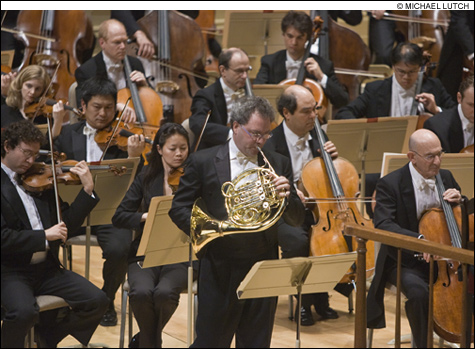
BLOWING ELLIOTT’S HORN: The performance of Carter’s Horn Concerto by James Sommerville
and the BSO was another season highlight. |
James Levine’s devotion to the music of Elliott Carter — surely America’s greatest living composer, and maybe the greatest American composer ever — has been a boon to Boston. The highlight of the latest Boston Symphony Orchestra concert was Carter’s new Horn Concerto, which the BSO commissioned for its principal horn player, James Sommerville. It’s a delight, though as with anything by Carter, a single hearing is barely enough to take in its riches.
The performance seemed to go by much more quickly than the 11 minutes it actually took. It’s filled with incident: seven interlocked sections that change dramatically in speed, rhythm, and timbre. I can hardly think of another composer who’s caught so many of the sounds a horn can make, from muffled grunting to lyric outpouring to heroic trumpeting. As in most (all?) concertos, the solo instrument seems to represent the composer himself, here in his many moods of exploration and discovery, nervousness and soulfulness, self-abasement and self-assertion (that last blast), vigorous engagement and playfulness, and deepest solitude. The most immediately affecting passages, as often the case with Carter, were the eloquent slow ones. The second section is a lonely solo for the horn played against a flickering background of distant muted brasses. Three movements later, there’s another slow section, a Mahlerian Largo riding over hardly identifiable rumblings. (The score calls for 27 different percussion instruments.)
The performance seemed expert on the part of Levine and the orchestra and phenomenal on the part of Sommerville — though I also have a nagging sense that his playing was not yet as fully open to the concerto’s emotional and lyrical possibilities.
Bracketing the Carter were Haydn’s magnificent last symphony (No. 104, the London, in D) and Mahler’s exuberant first (also in D). The Haydn sounded unexceptional and pedestrian; the Mahler seemed awfully “adult,” more like a work of reflective age, like his Ninth Symphony, which Levine had led so memorably the week before, than Mahler’s youthful explosion of joy (especially joy in Nature), sarcasm, and rage. The first movement, marked “Schleppend” (“dragging,” as in the verb “to schlep”), was a little too weighty for its own good. Bassist Laurence Wolfe got closer to the right spirit in his third-movement solo, Mahler’s version of “Frère Jacques” in a coolly ironic minor key.
At Harvard the following day, Carter was presented — for the second time (the first was in 1988) — with the BSO’s prestigious $5000 Mark M. Horblit Award for distinguished symphonic composition by an American composer. “I’ve become a French horn,” the about-to-be-99-year-old Carter said when asked by Harvard’s Anne Shreffler about the new concerto. “It’s hard for me to talk about my pieces. I sit down and write and write and write. It’s hard to feel I’m the composer. I don’t know where they come from.” The award, he felt, was not for himself but for his music. “And my music is very grateful.”